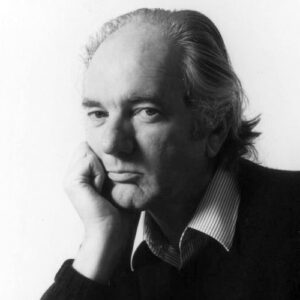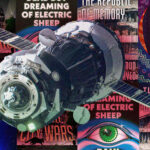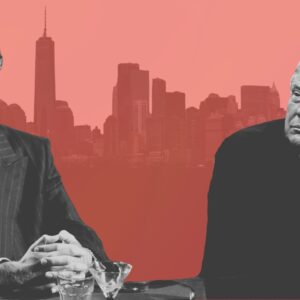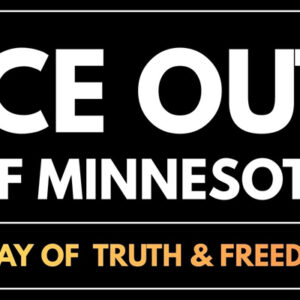
10 Contemporary "Dickensian" Novels
Because "Kafkaesque" is Like, So 2018
206 years ago, Charles Dickens was born, and the literary world hasn’t stopped talking about him since. (Well, technically since about 20 years after that, when he started publishing his work, but you see what I’m trying to do here.) Like “Kafkaesque” and “Orwellian,” “Dickensian” has become one of those over-used but useful terms for describing a certain kind of novel: in this case, as Francine Prose summed it up, one that features “a large cast of vividly drawn characters, some of them grotesques with comically descriptive names and odd tics of speech and behavior; a plucky orphan who overcomes a childhood blighted by humiliating poverty or simple lower-class misery; numerous and ingeniously interconnected subplots; panoramic shifts of location; a narrative that makes the reader finish each chapter eager to begin the next.”
Though of course, as Prose points out, those features aren’t exactly, or at least not entirely, what makes a Dickens novel great literature. “Often missing from so-called Dickensian novels are the aspects of Dickens—his originality, his intelligence, his witty and precise descriptions, the depth and breadth of his powers of observation, his cadenced, graceful language—that can temper the urgency of our impulse to keep reading with the desire to read passages aloud, preferably to another person,” she writes.
And whether accurate or not, the term can be reductive. “Regardless of how sophisticated one’s sense of Dickens’s oeuvre might be,” Matthew Sherrill wrote in The Paris Review, “the popular use of Dickensian conjures, whether we like it or not, shivering orphans, cloying sentimentality, fortuitous coincidence, and virtue rewarded. At the same time, and more interestingly, it delimits and cheapens the work of the alleged Dickensian.”
Still, the term can, if nothing else, indicate to a reader what kind of book they’re getting into—it suggests the sense of a book more than it gives an exact description. And as Sherrill suggests, it is a hopeful word:
To those fretting over the supposedly stultifying effects of digital media, a Dickensian novel promises to repay sustained, readerly attention—promises to help us rediscover the joys inherent in narrative, the joys supposedly known to 19th-century readers. To those concerned with the insularity of literary culture, anything Dickensian is an invitation to a broader, more demotic readership. To those irritated by the preponderance of detached, ironic, sensibilities, Dickensian works augur the return of unabashed sentiment, or at least of sincerity. And to those alarmed at American socioeconomic conditions, so often compared to those of the Industrial Revolution, Dickensian gestures toward a more socially alert, inclusive fiction—witness The Wire, which was so often saddled with the descriptor that the show ran an episode called “The Dickensian Aspect.”
So, despite the fact that it’s often inaccurate and reductive and possibly immoral, I understand why we like to call novels “Dickensian.” Over 200 years after the writer’s death, we’re just looking to recapture the feeling his canonical works gave us in some of our contemporary literature. If that sounds like something you’re interested in, some suggestions below.
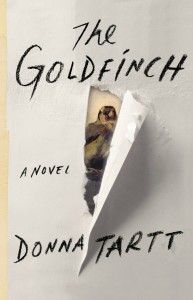 Donna Tartt, The Goldfinch
Donna Tartt, The Goldfinch
Remember Francine Prose and Matthew Sherrill from the introduction? They were talking about The Goldfinch, which critics fell all over themselves to describe as “Dickensian” when it was first published in 2013. It’s not a bad description for the book, which is wonderful but baggy—much like Dickens—and anyway, how can I argue with Stephen King, who wrote that
Like the best of Dickens (I will not be the last to make this comparison), the novel turns on mere happenstance—in this case, a heavy rainstorm in New York City. . . .
Theo washes up with the poshy-posh Park Avenue Barbour family instead of in the workhouse, and meets a kindly furniture restorer named James Hobart (“but everyone calls me Hobie”)—a Dickensian character if there ever was one—who will become a friend for life. . .
We get Dickensian dollops of suspense—most notably a hair-raising Nighttown adventure in pursuit of dangerous gangsters—and plenty of brilliant characterization. Of Mrs. Barbour, for instance: “Even when she was standing right next to you she sounded as if she were relaying transmissions from Alpha Centauri.”
Or Michiko Kakutani, who explained that
Ms. Tartt has made Fabritius’s bird the MacGuffin at the center of her glorious, Dickensian novel, a novel that pulls together all her remarkable storytelling talents into a rapturous, symphonic whole and reminds the reader of the immersive, stay-up-all-night pleasures of reading. . . .
Ms. Tartt is adept at harnessing all the conventions of the Dickensian novel—including startling coincidences and sudden swerves of fortune—to lend Theo’s story a stark, folk-tale dimension as well as a visceral appreciation of the randomness of life and fate’s sometimes cruel sense of humor.
Or Maureen Corrigan in NPR, who used up her very last “Dickensian” on the novel:
“Dickensian” is one of those literary modifiers that’s overused. But before I officially retire this ruined adjective (or exile it to Australia, as Dickens himself would have done), I want to give it one final outing, because no other word will do. Here goes: Donna Tartt’s grand new novel, The Goldfinch, is Dickensian both in the ambition of its jumbo, coincidence-laced plot, as well as in its symphonic range of emotions.
You see what I mean.
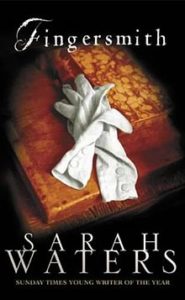 Sarah Waters, Fingersmith
Sarah Waters, Fingersmith
This one’s a little bit more obvious, set as it is in Victorian-era Britain, and consciously referencing Dickens’s work (on the first page, no less). But Dickens would never have gotten close to the delicious love affair in Fingersmith, which I won’t spoil for you here, and Waters takes her starting point and leaps forward as the book progresses. As Adam Mars-Jones put it in The Guardian:
Dickensian, too, is the chime between Mrs Sucksby’s name and her sideline of “farming” babies, her version of childcare relying heavily on the soothing properties of gin (other emblematic names include Mrs Cakebread the cook and the brutally porcine Nurse Bacon). Waters is confident enough to try some Dickensian grotesquerie of her own—”Oh my crikey! Dainty, pass me an infant, I want something to squeeze”—but she also knows when to stop.
As part of an ambitious criminal scheme, Sue is sent to Briar, a forbidding great house near Marlow, to be maid to an heiress, Maud Lilly, whose life is ruled by her bookish but tyrannical uncle. Picaresque gives way to gothic, and the reference points change from Dickens and Mayhew to Brontë and Poe.
Fun activity: watch Park Chan-wook’s adaptation of Fingersmith, retitled The Handmaiden, and think of Dickens while you do. It might actually help you keep your cool…
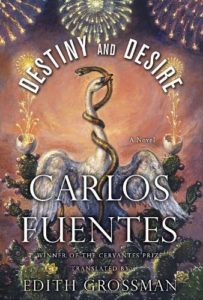 Carlos Fuentes, tr. Edith Grossman, Destiny and Desire
Carlos Fuentes, tr. Edith Grossman, Destiny and Desire
Fuentes’ over-the-top epic is filled with orphans, travels, secrets, family struggles, ghosts, severed heads, convicts, colorful characters, political commentary and plot twists. What’s more, the author himself acknowledges Dickens as a major influence:
I had a very deep sense of Dickens as I wrote this. Charles Dickens was very present when I wrote the novel especially because the young men do not know who their parents are. There is a go-between, he’s a mysterious lawyer who doesn’t tell the men who their parents are. He plays that ‘go-between’ role very commonly found in Dickens’ novels. So, it’s a very Dickensian novel in that sense.
Straight from the horse’s mouth.
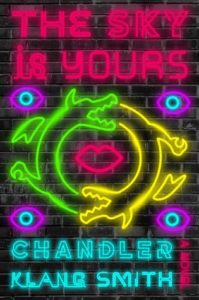 Chandler Klang Smith, The Sky is Yours
Chandler Klang Smith, The Sky is Yours
If you read Dickens primarily for grotesque characters, amusing wordplay, and social satire, this is the contemporary analogue for you. Filled to the brim with goofy, illustrative names for larger-than-life characters on ludicrous missions, The Sky is Yours reads like Dickens if Dickens was fast-forwarded 500 years into the future and then dropped acid for good measure, because why not, you only live once, even if you’re immortal forever.
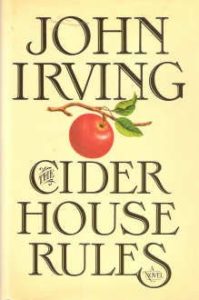 Pretty much everything by John Irving
Pretty much everything by John Irving
John Irving first read Great Expectations as a 14-year-old—and that was pretty much that. “Great Expectations is the first novel I read that made me wish I had written it,” he wrote in an introduction to a 1986 edition of the book.
It is the novel that made me want to be a novelist—specifically, to move a reader as I was moved then. I believe that Great Expectations has the most wonderful and most perfectly worked-out plot for a novel in the English language; at the same time, it never deviates from its intention to move you to laughter and to tears. But there is more than one thing about this novel that some people don’t like—and there is one thing in particular that they don’t like about Dickens in general. Here is the thing highest on the list that they don’t like: the intention of a novel by Charles Dickens is to move you emotionally, not intellectually; and it is by emotional means that Dickens intends to influence you socially. Dickens is not an analyst; his writing is not analytical—although it can be didactic. His genius is descriptive; he can describe a thing so vividly—and so influentially—that no one can look at that thing in the same way again.”
Ketzel Levine (among others) has pointed out, Dickens’s “influence isn’t difficult to spot in Irving’s novels. The World According to Garp, The Cider House Rules, A Prayer for Owen Meany—all are spiked with Dickensian melodrama: Complex plots and perilous encounters. Children orphaned. Lives sacrificed for the greater good. Social and moral dilemmas lie at the heart of their work, often emphasized with a heavy hand.” Or as Thomas Mallon put it in a 2012 review of Irving’s In One Person: “The author’s stylistic virility has always depended on performance-enhancing devices that literary fiction tried to outlaw years ago—big-hearted, Dickensian contrivances—and, at seventy, he is waving a rainbow flag on this latest trip over the top.” May he never stop.
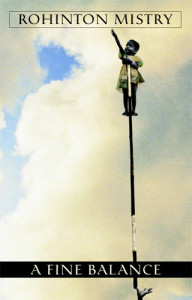 Rohinton Mistry, A Fine Balance
Rohinton Mistry, A Fine Balance
Mistry’s second novel is the story of four normal people in an intensely charged political moment—when Prime Minister Indira Gandhi refused resignation and instead declared a state of emergency. Sprawling, intricate, and vibrant, it may be most Dickensian in its treatment of poverty, in this case complicated by caste. Of the novel, Radhika Jones wrote:
I’ve said that nobody writes like Dickens anymore, but it’s still possible for a writer to attain a Dickensian effect. All you need to do is invent a deeply detailed and immersive fictional world, fill it with characters from all strata of society, plot it with cunning and intricacy and create the overall impression of real life. Rohinton Mistry nails it with this novel set in 1970s Bombay against the backdrop of Indira Gandhi’s State of Emergency, in which a widow named Dina Dalal takes in three boarders whose lives become intertwined with hers in ways both magical and terrible.
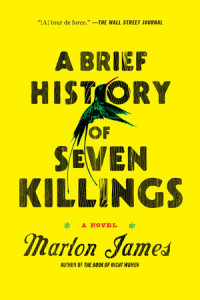 Pretty much everything by Marlon James
Pretty much everything by Marlon James
In a 2014 interview with Interview (RIP) about his Booker Prize-winning novel A Brief History of Seven Killings, James explained his affinity with Dickens:
One of my formative influences as a writer is Dickens, and I still consider myself a Dickensian in as much as there aspects of storytelling I still believe in—plot, surprise, cliffhangers. I still believe you should make them laugh, make them cry, make them wait. In many ways I’m an old-fashioned novelist. I have a rule when I’m writing, which comes from my love of Victorian novels, that at the end of a writing day [I ask myself,] is there anything that made me go, “Wow, I did not see that coming”? And if there’s not I continue writing until there is. The risk you run is melodrama. But you have to risk it.
By the way, this also applies to his latest novel, Black Leopard, Red Wolf, which Jia Tolentino recently called “as emphatic a statement of literary ambition as you’ll find in contemporary fiction” and likened to “a kaleidoscopic, coke-spiked Our Mutual Friend” in The New Yorker. No wonder it’s on everyone’s must-read-next list.
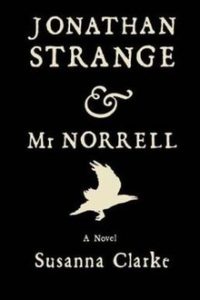 Susanna Clarke, Jonathan Strange & Mr. Norrell
Susanna Clarke, Jonathan Strange & Mr. Norrell
Another sprawling historical novel with wild characters and weird adventures—though this time tinged with a large amount of magic, which led many to mistakenly liken it to “Harry Potter for adults.” But as Ron Charles wrote, “Jonathan Strange & Mr. Norrell is no Harry Potter knockoff. It’s altogether original—far closer to Dickens than Rowling.” Rowling’s scope is relatively limited—Clarke’s seems to encompass all of history. Plus of course, it’s closer to the correct time period. Gregory Maguire has noted that both Mr. Strange and Mr. Norrell “seem like sidekicks out of Dickens, promoted onto a central stage before they’ve had the chance to develop as prime-time players,” which is fair enough, but unlike in Dickens, the characters aren’t as much the point here as the grand historical significance of their actions.
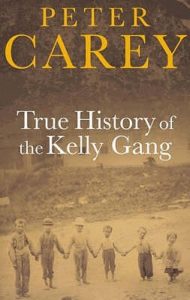 Peter Carey, Jack Maggs and True History of the Kelly Gang, etc.
Peter Carey, Jack Maggs and True History of the Kelly Gang, etc.
Peter Carey is another author whose entire career owes something to Charles Dickens—he has been described as “the outback Dickens” and has written at least one literally (actively? pointedly?) Dickensian novel: Jack Maggs, which John Banville has called “a sort of postmodernist hommage to Great Expectations.” Banville also highlights True History of the Kelly Gang as showing signs of the giant’s influence, noting that “in true Dickensian fashion . . . the book on the first page finds its narrator recalling a moment of illumination and warmth among the squalors of his early childhood:
My 1st memory is of Mother breaking eggs into a bowl and crying that Jimmy Quinn my 15 yr. old uncle were arrested by the traps. I don’t know where my daddy were that day nor my older sister Annie. I were 3 yr. old. While my mother cried I scraped the sweet yellow batter onto a spoon and ate it the roof were leaking above the camp oven each drop hissing as it hit.”
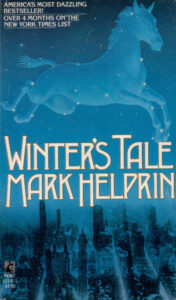 Mark Helprin, Winter’s Tale
Mark Helprin, Winter’s Tale
It may reference the title of a classic play, but as John Rubins writes in The New York Review of Books, “The prime lender here is not Shakespeare, as it happens, but Charles Dickens.”
From the opening intonation (“For the whole world has poured its heart into the city by the Palisades…”) to the closing benediction (“that is a question which you must answer within your own heart”), Helprin takes on the hearthside, grave yet hortatory tone of early middle-period Dickens. His hero, master mechanic and thief Peter Lake, is a poor orphan babe—abandoned in New York harbor by doomed turn-of-the-century immigrants, reared in the Overweary Home for “boys of the street who had gone mad.” In a city with “many millions on the run, always in the pitch of events, robbed even of their own inner tenderness,” Peter briefly joins a criminal gang called the Short Tails, whose leader Pearly Soames will become his pursuing nemesis through the decades. He is forever haunted by a Nicklebyan glimpse of a child in a hallway, “barefooted, bareheaded, dressed in filthy rags, starving, blind, abandoned.” He turns away from thievery, woos and wins the beautiful daughter of a newspaper tycoon; but she’s gentle soul fated to die young, as unjustly as Paul Dombey or Little Nell or Georgina Hogarth.
Indeed, from chapter titles to meaningfully comic names (Deacon Bacon, Reverend Mootfowl), the reliance on literary echoes for ballast remains a primary feature of Winter’s Tale, even when fantasy moves the plot along or catches the eye with whimsy. Peter Lake, fleeing from those Short Tails (and all their underworld allies) on his white horse Athansor, escapes certain death through a decorative miracle—part Greek mythology, part Shakespeare, part Action Comics: the horse flies, Peter Lake plunges into the clouds, and is apparently freeze-dried, reappearing 150 pages later (out of an ice floe near Staten Island) in the unjust Manhattan of the 1990s. But coincidental meetings, life-affirming eccentrics, and chastely intense romances all Victorianize this futuristic, fairy-tale New York. And Peter continues his Dickensian quest for justice there, a quest that’s paralleled by the misty aspirations of several other pure-hearted seekers, each with a somewhat different notion of “a perfectly just city.”
If only such a thing existed.
Emily Temple
Emily Temple is the managing editor at Lit Hub. Her first novel, The Lightness, was published by William Morrow/HarperCollins in June 2020. You can buy it here.









